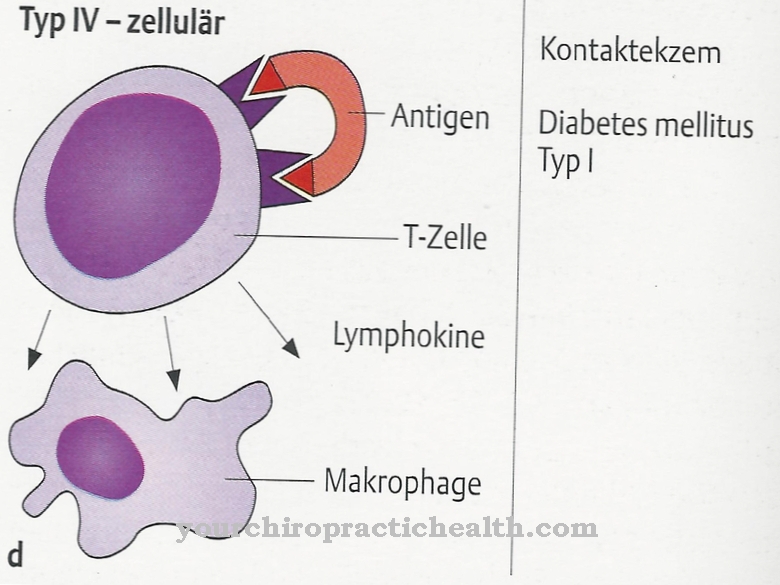The Hypoglycaemia factitia is a hypoglycemia with the characteristic symptoms that is brought about by the patient with full intent. Most of the people affected are people with Munchausen syndrome. In addition to symptomatic treatment of hypoglycemia, causal therapeutic treatment must be applied to protect the patient from himself.
What is Hypoglycaemia Factitia?

© motortion - stock.adobe.com
In the case of hypoglycemia, the blood glucose concentration in the blood falls below a physiologically intended normal value of 60 mg / dl, i.e. 3.3 mmol / l. In newborns, a value of 45 mg / dl or 2.5 mmol / l is already the critical limit. Hypoglycaemia manifests itself in the form of a disturbed regulation of glucose release by the liver and glucose uptake in the consuming organs.
Due to a reactive adrenaline release, symptoms such as tremors, sweating, palpitations and cravings occur in hypoglycaemia. Neuroglycopenic signs due to glucose deficiency in the central nervous system often manifest themselves in the form of drowsiness, speech disorders, visual disturbances, paresthesias, or atypical behavior. Extreme hypoglycaemia is associated with coma.
The Hypoglycaemia factitia is a self-induced hypoglycemia. In the case of the clinical picture, self-administration of blood sugar-lowering substances causes blood sugar to drop significantly. Patients deliberately lower their blood sugar to dangerous levels even though they do not have diabetes and thus risk hypoglycaemia by taking antidiabetic drugs. The hypoglycemia is wanted by the patient, although or precisely because it is pathological.
causes
The hypoglycaemia factitia usually occurs in the context of Munchausen syndrome. Those affected by this mental illness regularly fake complaints in order to receive the associated care when they are in hospital. Often times, this type of disorder occurs in people who are close to chronically ill people.
The Münchhausen-by-proxy syndrome is a special form in which parents require their healthy children to pretend symptoms. The etiology of the syndrome is currently unknown. Psychological deprivation may play a causal role in the syndrome. In most cases of hypoglycaemia factitia, those affected achieve the desired hypoglycaemia through antidiabetic drugs.
Since they are not diabetic, the use of the blood sugar lowering agents often leads to dangerous hypoglycaemia with the characteristic symptoms. The clinical picture differs from involuntarily induced hypoglycaemia through the psychological component. The diagnosis is relatively difficult because it requires evidence of the deliberate provocation of the hypoglycaemia.
Symptoms, ailments & signs
Patients with hypoglycaemia factitia suffer from the characteristic symptoms of hypoglycaemia. Because of the adrenaline they are trembling, they sweat and have a racing heart. In addition to cravings, there is paleness. Because of the lack of glucose in their central nervous system, patients feel drowsy and confused.
They suffer from speech and vision problems such as double vision. According to their loved ones, they show atypical behavior. In addition, sensory disorders such as deafness or psychotic episodes and even delirium can occur. If the blood sugar falls below 40 mg / dl, seizures and loss of consciousness occur. In addition, hypoglycaemia is associated with unspecific accompanying symptoms such as nausea, more or less severe dizziness and headaches.
The clinical picture of patients with hypoglycaemia factitia does not differ from that of hypoglycaemia. The only differentiation criterion is the deliberate induction of the symptoms, that is, the desire to suffer the symptoms described due to hypoglycaemia.
Diagnosis & course of disease
The diagnosis of hypoglycaemia factitia poses a great challenge for the doctor. Patients will not admit that they caused the hypoglycemia on purpose. A corresponding suspicion can exist from the anamnesis.
In the case of people diagnosed with Munchausen syndrome, for example, the doctor is more likely to think of hypoglycaemia factica. Urine and serum are examined to prove the deliberate use of antidiabetic drugs as the cause of the hypoglycaemia. In the laboratory, it shows degradation products of sulfonylurea. If the patient has deliberately administered insulin, no increase in the C-peptide can be detected with increased insulin.
Complications
Hypoglycaemia factitia not only leads to physical, but also to psychological complaints. In most cases, the patient has acute hypoglycaemia, which in the worst case scenario can cause the patient to lose consciousness. The loss of consciousness often leads to a fall in which the person concerned can injure himself.
Paralysis and sensory disturbances also occur. The affected person can no longer concentrate properly and is no longer resilient. Dizziness and severe nausea develop. The eyesight can also decrease and it is not uncommon for double vision or veiled vision to occur. The quality of life of the patient is extremely limited for a short time by the hypoglycaemia factitia.
Since the affected person usually initiates the symptoms himself / herself on purpose, there are also psychological complaints, so that those affected suffer from severe mental illnesses and depression. Not infrequently this leads to social exclusion, for which psychotherapy is usually necessary. In severe cases, treatment in a closed clinic may be necessary. However, there are no complications with the treatment itself.
When should you go to the doctor?
With hypoglycaemia factitia, a visit to a doctor is necessary in any case. In the worst case, the disease can lead to the death of the person affected or to serious permanent damage. Since it is a mental illness, relatives and friends in particular must pay attention to the symptoms of hypoglycaemia factitia and lead the person affected to treatment. As a rule, the patients suffer from cramps and severe muscle pain.
There is also general listlessness and drowsiness, and in extreme cases those affected can also lose consciousness. Persistent dizziness and impaired concentration indicate the disease. In some cases, numbness or visual problems can occur, which in the worst case can persist. For hypoglycaemia factitia, a general practitioner or a psychologist should be consulted. Treatment often still requires a visit to a special clinic to limit the disease.
Doctors & therapists in your area
Treatment & Therapy
In the case of acute hypoglycaemia, the blood sugar must be equalized immediately. The doctor creates this kind of compensation in patients with hypoglycaemia factitia by intravenous substitution of five percent or ten percent glucose. As a rule, potassium must also be substituted. This substitution takes place through the shift into the cell interior.
As soon as the blood sugar has stabilized, a potassium shift in the cells can occur. In principle, however, the treatment described in the context of hypoglycaemia factitia is not a causal therapy. In this case, hypoglycemia is merely the symptom of a higher-level mental illness, which generally corresponds to Munchausen syndrome.
Balancing blood sugar brings the patient out of danger, but does not cure him of the bigger picture. The patient can only be cured through causal therapy and ideally will never again provoke hypoglycaemia.
The causal treatment for hypoglycaemia factitia corresponds to psychotherapy. The psychotherapeutic treatment of Munchausen syndrome is relatively complex, as the etiology of the disease has not yet been adequately researched.
prevention
The main aim of preventing a hypoglycaemia factitia is to stabilize the psychological situation. Ironically, patients with Munchausen syndrome do not want to prevent hypoglycaemia factitia, so that prevention is often the responsibility of their relatives. Anyone who notices features of Munchausen syndrome in a loved one should ideally do everything in their power to transfer the person concerned to psychological care as soon as possible.
Aftercare
Once the blood sugar level has equalized, follow-up care for hypoglycaemia factitia begins. This includes therapy that deals with the root cause. In order to start here, the patient must first have the will to arm himself against the disease. Psychotherapeutic care is therefore very important so that those affected no longer try to consciously and deliberately induce hypoglycaemia.
The psychological causes are usually very complex, which is why this follow-up therapy can drag on over a longer period of time. At the same time, the relatives should pay attention to the typical signs of Munchausen syndrome in order to limit the risk. It is therefore important to get to know the patient's intentions better and to recognize them early in an emergency. A healthy lifestyle helps to combat the typical tremors and palpitations.
The problem, however, is that people want to cause these symptoms themselves. But the associated visual disturbances make them drowsy and significantly reduce their quality of life. In the course of aftercare and self-help measures, there are therefore no general approaches. The high-risk patients need attentive care and must find out for themselves how dangerous the hypoglycaemia is for their organism.
You can do that yourself
Hypoglycaemia factitia is a special form of the disease, as the patients deliberately induce the typical hypoglycaemia. The temporary symptoms such as tremors, palpitations, drowsiness and visual disturbances significantly reduce the quality of life of the affected people, but the experience of these symptoms is intentional by the patient. For this reason, there are hardly any starting points for self-help measures for people with hypoglycaemia factitia, at least not during a phase of acute hypoglycaemia.
At the same time, the patients suffer from mental disorders, which also make self-help more difficult. Basically, the patient must be willing to overcome the disease and not to deliberately induce any further hypoglycaemia. The existing mental illnesses often make it difficult for patients to seek psychotherapeutic treatment.
In some cases, the hypoglycaemia factitia leads to complications that are sometimes life-threatening for the sick. Because in delirium, falls or accidents are possible. Therefore, it is sometimes necessary that patients receive treatment in a closed institution for mental illness. Support from relatives and other social contacts usually has a beneficial effect on the progress of the therapy. When the underlying mental illness is cured, the factitia hypoglycaemia disappears.













.jpg)

.jpg)
.jpg)











.jpg)